Learn how a $100,000 FRAXA research grant supports Yale researchers in using Slack potassium channel inhibitors to treat Fragile X syndrome by normalizing behaviors in FMR1 knockout mice.
Read moreResearcher
Roles of Postnatal Transient Connectivity in the Development of Fragile X Syndrome
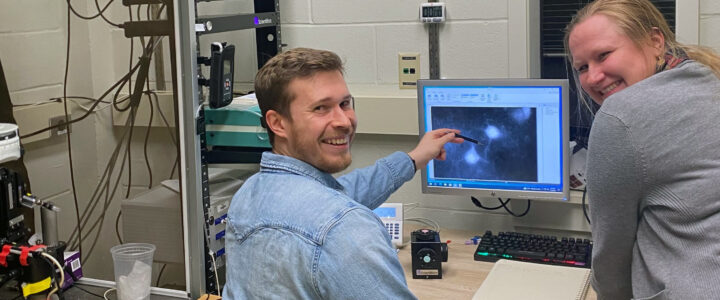
A $100,000 FRAXA research grant awarded to Gabrielle Pouchelon, PhD, and Dimitri Dumontier, PhD, at Cold Spring Harbor Laboratory fuels groundbreaking research on Fragile X syndrome. Their work focuses on understanding sensory sensitivities and developing a noninvasive screening method, a potential game-changer for families affected by Fragile X syndrome.
Read moreA Tat-Conjugate Approach to Treat Fragile X Syndrome

Explore Turner Lab’s novel approach to developing definitive treatment for Fragile X syndrome with a Tat-conjugated, truncated FMRP protein. This innovative strategy aims to restore brain circuit function and reduce abnormal behaviors linked to Fragile X by directly addressing the cause of Fragile X: a missing protein.
Read moreThe Endocannabinoid System and Fragile X Syndrome

Explore groundbreaking research on the potential of Cannabidiol (CBD) in modulating the endocannabinoid system for Fragile X syndrome therapy. Discover how CBD could change the natural course of Fragile X.
Read moreInnovative Breakthrough in Fragile X Treatment: The Promise of Antisense Oligonucleotide (ASO) Therapy

This changes everything! FRAXA funded research introduces Antisense Oligonucleotide (ASO) Therapy, redefining Fragile X syndrome treatment and understanding.
Read moreUnraveling Fragile X Syndrome: New Insights into FMR1 Gene Reactivation

Discover groundbreaking methods for reactivating the FMR1 gene in Fragile X syndrome. Dive into the transformational research and the implications of self-healing at a cellular level.
Read moreAllos Pharma Advances Phase 3 Clinical Trial Design for Potential Fragile X Syndrome Treatment, Arbaclofen

Discover Allos Pharma’s advancements in a pivotal Phase 3 trial for Fragile X syndrome treatment, Arbaclofen. Learn how their FDA-informed trial design might finally bring hope to the Fragile X community.
Read moreModeling Fragile X Syndrome using Multi-Region Human Brain Organoids

Discover groundbreaking research at UCI by Dr. Watanabe and Dr. Tsai. Using cutting-edge organoid technology, they’re modeling Fragile X brain function and advancing potential treatment testing.
Read moreSRC Family Kinase Inhibitor as a Potential Treatment for Fragile X Syndrome
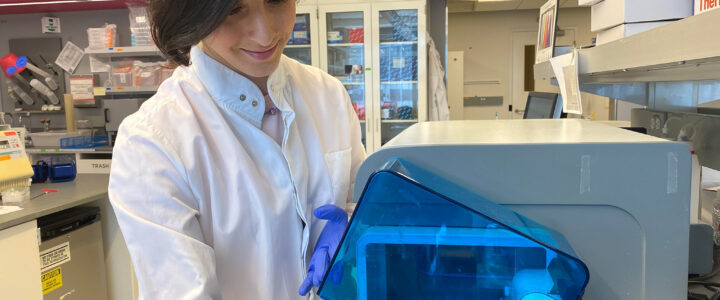
Discover the Smith lab’s new approach to treating Fragile X syndrome using Saracatinib, originally a cancer drug. Learn how this $100,000 FRAXA research grant-funded study opens up hopeful avenues.
Read moreFragile X Syndrome and Cancer Research: Unexpected Links and Opportunities for Collaboration

Discover unexpected links between Fragile X Syndrome and cancer. Studies show people with Fragile X have much lower cancer rates. Explore new opportunities for collaboration in this promising research.
Read moreUsing Exosomes to Discover Fragile X Biomarkers

How can a blood test give an accurate picture of brain activity? With this grant from FRAXA, Dr. Martire and Dr. Boussadia will try to use unique particles called exosomes – which can travel from brain cells to the blood stream – to evaluate the effects treatments are having on the brain.
Read moreFRAXA Investigator Lynne Maquat Awarded 2023 Gruber Genetics Prize

Dr. Maquat, 2023 Gruber Genetics Prize winner, discovered NMD, a key surveillance system in the body that protects against mistakes in gene expression. Her groundbreaking research has led to new therapies for Fragile X syndrome.
Read moreTargeting Cognitive Function in Fragile X Syndrome
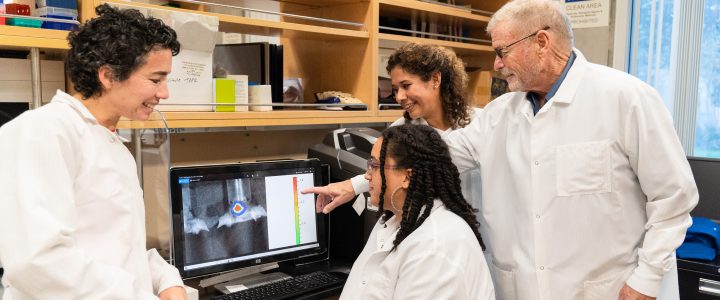
It has long been assumed that the differences between males and females with Fragile X were simply a matter of degree, with males being more severely affected. But gender differences may be far reaching. This team is working to understand imbalances in how the brain’s neurons transmit signals, with a focus on how differently males and females learn and experience anxiety. They are studying two neuronal pathways which are promising targets for treatment.
Read moreValidating Novel Inhibitors of ERK Signalling to Treat Fragile X Syndrome

One promising treatment approach for Fragile X syndrome is to inhibit on a neuronal pathway, ERK. ERK inhibitors are also being studied as treatments for other disorders including autism.
This team has conducted pilot studies showing that ERK inhibitors are very effective in reversing signs of disease in Fragile X mice. With this grant from FRAXA they will take the next steps toward possible clinical trials of an ERK inhibitor for individuals who have Fragile X syndrome.
Targeting Serotonin 1a Receptors to Reverse Neurobehavioral Phenotypes
Neurolixis’ new drug targets serotonin 1A receptors, showing promise in preclinical studies for Fragile X syndrome, funded by a FRAXA grant for future clinical trials.
Read more10 Year Vision for Fragile X Research – Dr. Elizabeth Berry-Kravis & Dr. Patricia Cogram

In this video we hear from FRAXA Investigators Dr. Patricia Cogram, Professor at the University of Chile, and Dr. Elizabeth Berry-Kravis, Professor at Rush University Medical Center as they reflect on the progress that has been made and visualize what they see happening in the next 10 years for people living with Fragile X syndrome.
Read moreDevelopmental Motor Phenotype in Fragile X Syndrome

One of the lesser known signs of Fragile X is unsteady walking. This is also very easy to evaluate in the clinic: no blood tests are required! With a $100,000 grant from FRAXA Research Foundation, this team will develop objective new outcome measures of gait for future treatment trials and also to see if exercise could improve other symptoms of Fragile X.
Read moreSigma-1 Receptor as a Therapeutic Target for Fragile X Syndrome
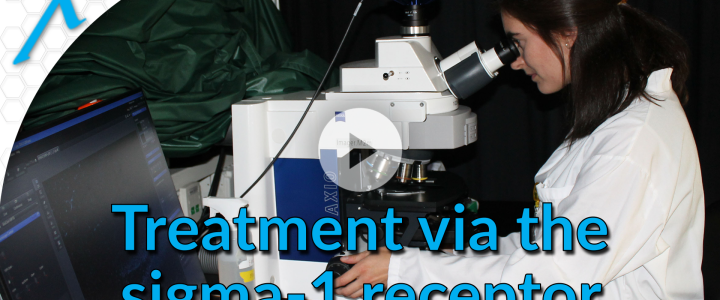
Dr. Pouladi’s team is exploring a treatment of Fragile X via the sigma-1 receptor. Drugs that boost activity at sigma receptors tend to calm down overactive neurons. They are also powerful anti-inflammatory drugs.
Read moreFragile X Clinical Trial of New PDE4D Inhibitor from Tetra

With a $200,043 grant from FRAXA Research Foundation, Dr. Elizabeth Berry-Kravis completed a successful Phase 2 clinical trial of a PDE4 inhibitor for adult men with Fragile X syndrome. This trial treated 30 males, 18-45 years of age with a new PDE4D allosteric inhibitor from Tetra Discovery Partners using a crossover design, so that everyone got active drug for part of the time and placebo for part of the time.
Read moreVersatile Drug Screening Platform for Fragile X Syndrome

Many experts believe that combinations of drugs may be needed to best treat Fragile X syndrome. How can we find the best combinations in the ideal doses? This project — a collaboration between a top university research team and an innovative AI startup both based in Belgium — tackles this challenge.
Read moreHuman FMR1 Isoform-Specific Regulation of Translation and Behavior

Fragile X syndrome is caused by lack of one protein, FMRP. But this one protein occurs in different variations. Do the different versions of FMRP have different roles in the brain, and if so, is there one that’s key? If we could replace FMRP to treat Fragile X syndrome, which version would we use?
Read moreFunctional and Genomic Characterization of Interneurons in the Fmr1-KO Mouse Brain

The brain’s balance is maintained by two types of neurons: those that excite and those that inhibit activity. Like yin and yang, this balance is essential. This team has found fewer than normal inhibitory cells in the brains of Fragile X mice. They are now working to pinpoint this abnormality and find ways to restore the normal balance and function.
Read moreTargeting Serotonin 1A Receptors in Fmr1 Knockout Mice
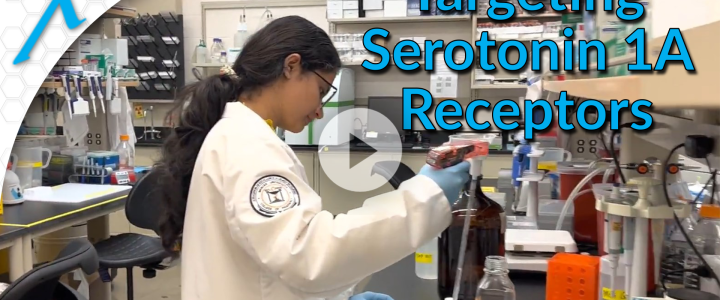
Dr. Canal has discovered a promising treatment approach for Fragile X syndrome: new compounds which specifically and potently boost serotonin in the brain. The target is the brain’s serotonin 1A receptor.
Read moreTranscriptional Signatures Sensitive to Cognition-Improving Pharmacological Treatments in Fragile X Syndrome
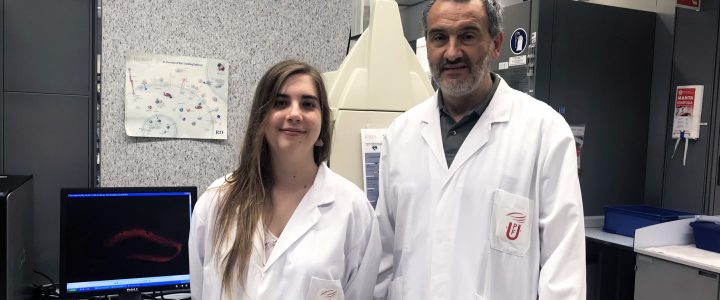
The Fragile X field needs biomarkers to accurately measure the effects of potential treatments in both Fragile X mice and in humans. Dr. Ozaita and his team have found molecular features in the brain that can serve as an objective signature for the syndrome. They will use this tool to test cannabidiol and two other drugs in mice.
Read moreCharacterization and Modulation of microRNAs in Fragile X Syndrome

Could microRNAs be a new path to treatment of Fragile X syndrome? MicroRNAs are disrupted in Fragile X, and so this team will work to understand what is going wrong and explore ways to correct it with drugs which directly target microRNAs.
Read more
